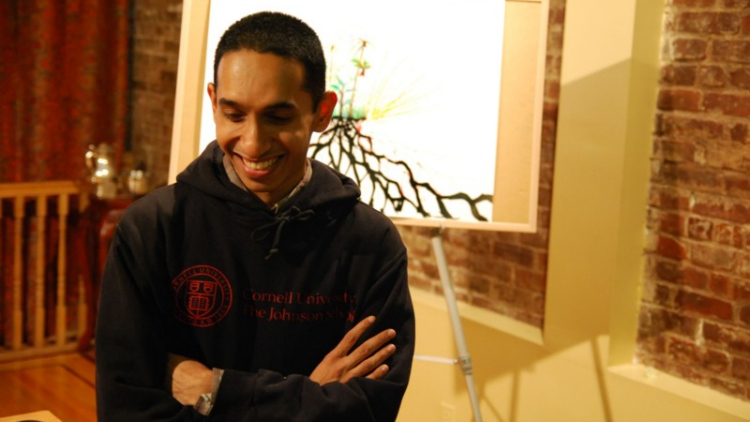The Return of a Cult Classic—Hare Krishnas are Back
By Bart Blasengame | May 16, 2014

The much-maligned Hindu sect has shed its freak-show status and, behind its yuppie-friendly pillars of yoga, meditation, and clean living, is transforming America into a postmodern ashram. Robes not required.
The past and present of Hare Krishna suns himself in the high-resolution glow of code as it scrolls down his computer screen. He is 31 and married to a doctor and, after five years as an architect, is making the transition into tech—working at the largest data-protection company in the world to study its market strategies, which he hopes to apply to the start-up he’s planning to launch. He is just like you: career-minded and ambitious. He has a slim build, short-cropped hair, a vegetarian diet, and a dedicated yoga regimen. It’s only if you happen to catch a glimpse of the string of tulasi-wood beads—a sign of devotion to Lord Krishna—tucked discreetly inside his collared shirt that you might become aware that Palaka Das is existing on a different plane.
He blends in now, but it wasn’t always this easy. When he was 12 and went by his birth name, Paul, his disapproving mom led him through their Lansing, Michigan, home and into their former dining room, a place his father had transformed into a high, holy shrine upon his conversion to something called Hare Krishna. Inside the room were melting candles and orange daisies and pictures of blue gods with four arms and men in saffron robes with paint marks on their foreheads—trinkets of faith that, to a sixth-grader’s eye, looked like something out of Indiana Jones and the Temple of Doom. “You see that guy?” his mother said, pointing to a photo of a rapturous Bhakti Tirtha Swami, a Hare Krishna holy man. “That’s the guy that brainwashed your father.”
For a boy growing up in the Midwest, Hare Krishna wasn’t exactly a ticket to the cool kids’ table. Then there was Palaka’s agnostic mom bemoaning his father’s conversion and an aunt—a professor at Michigan State—proclaiming that the Krishnas were a cult that would run off with your firstborn. But when things got metaphysical? When you put down the Nintendo controller, crept into your dad’s lair, grabbed his japa beads, started chanting “Hare Krishna, Hare Krishna, Krishna Krishna, Hare Hare, Hare Rama, Hare Rama . . .” while focusing on a painting of Radha, Krishna’s consort, and your body started vibrating—honest to Godvibrating? Well, some things you didn’t question.
Now living in a brick town house in Brooklyn, Palaka Das spends his time painting, playing pickup basketball, and working at the Hare Krishna temple in the Boerum Hill neighborhood, surrounded by hundreds of like-minded brownstone-dwelling devotees. “It’s like my dad said,” Palaka explains. “‘Everyone has different paths to God. Some need a Honda, some need a Rolls-Royce, and some are just walking.'”
Nowadays, many people are flat-out running. Nearly 50 years after Srila Prabhupada journeyed from India to America to bring the new teachings of Krishna to a generation of Western burnouts, Hare Krishnas have moved out of the airports, into the streets, and into the cubicle right next to yours. The sect’s once-exotic-sounding core practices of mindfulness and vegetarianism—the very beliefs that early on relegated it to the “freak” aisle—have spread virally, turning America into a postmodern ashram. We don’t pray anymore; we go on Facebook to ask that good thoughts and positive energy be magically zapped to us. We don’t plant our dead in the ground; we feed their ashes to the cosmos. We seek out veggie burgers and lie to ourselves about the deliciousness of kale while contorting our bodies into wordless physical devotionals. Yes, Christianity and Islam may have the numbers, but Hare Krishna—the little sect that could—is winning the culture war.















